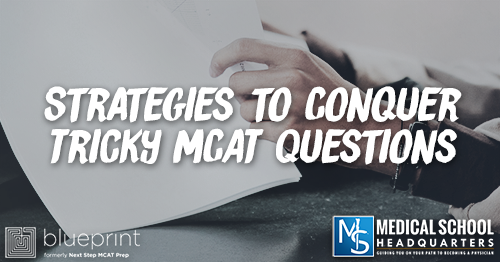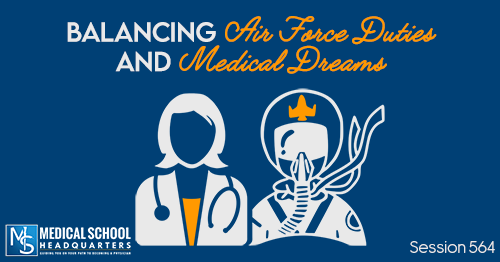THE FOLLOWING ARE QUESTIONS FOR A NEW SERIES OF POSTS ENTITLED “READER PROFILES.” EACH POST IN THIS SERIES WILL DETAIL THE CURRENT SITUATIONS AND CHALLENGES OF A MEDICAL SCHOOL HQ READER. THE PURPOSE OF THIS SERIES IS TO HELP US ALL IDENTIFY WITH PEOPLE LIKE US (IN SIMILAR SITUATIONS — NOT ALL WILL BE, OF COURSE, BUT EVENTUALLY I’M SURE YOU WILL FIND SOMEONE LIKE YOU HERE), GET TO KNOW THE FREQUENT COMMENTERS ON THE SITE, AND HEAR SOME WISDOM/CHALLENGES FROM PEOPLE OTHER THAN THE SITE CREATORS. I BELIEVE THIS SERIES IS A GREAT ALTERNATIVE TO THOSE THAT DON’T ENJOY DIGGING AROUND FORUMS FOR INFORMATION ABOUT SITUATIONS THAT THEY MAY BE CURRENTLY PLAGUED WITH. USE THE BELOW QUESTIONS AS THE OUTLINE. YOU CAN EXPAND EACH ANSWER BEYOND THE DEFAULT QUESTIONS I HAVE ENTERED. ADD ANYTHING YOU FEEL WILL BE HELPFUL TO THOSE AT THE START OF THEIR JOURNEY.
If you’re interested in contributing to this series, then drop me an email. The series can be a very valuable source for readers and I need a steady stream of new ones to keep it going.
Next in the series is MedicalSchoolHQ reader KH. She answered my questions (in red below) as follows:
Please tell us a bit about yourself (include where you are in your path to becoming a physician).
I’m someone who has always been interested in medicine. As an undergrad, I majored in biology/pre-med initially. When my GPA was about 3.25, I thought that was hopeless for medical school, and I transferred after my junior year into the junior year of a bachelor’s degree nursing program. So after 5 years, had a BSN degree (with SOME of the premed prerequisites). Worked as a nurse, mostly ICU/Cardiac Surgery ICU for 13 years then went to graduate school to become a certified nurse-midwife (I’d gotten certified as a childbirth educator some years before while having my own children so there was SOME tie-in). Worked with a family practice doctor in rural Tennessee at a National Health Service Corps site (they had paid for my MSN in nurse-midwifery). Then moved back to my home state where practicing as a midwife was difficult at the time. Ended up teaching nursing for about 7 years before deciding to go to medical school. Now I’m a 3rd year medical student, at 55 years old.
Describe your path to medical school (MCAT scores, undergrad GPA with emphasis on any difficulties in required courses, D.O. vs M.D. and why, and if you are further along in your training any other information you think would be helpful to others – i.e. AMCAS process tips, interview tips).
My undergrad GPA was about 3.25. My grad school was 4.0 …I’d figured out how to study for “A’s” which is quite different from studying to pass the class. It involves trying to have real mastery of the material so you could theoretically answer any question or explain it to others. I first tried to put together the courses I needed as a DIY (do-it-yourself) postbacc. I’d had plenty of biology credits with labs but they were, in my case, almost 30 years old. So retaking basic biology was necessary. I didn’t remember much chemistry at all, so I wanted to repeat Gen Chem I and II, and I needed to take second semester (and therefore retake 1st semester) of Organic Chemistry and Physics. Clearly, step one was getting into a general chemistry course. That was where I hit difficulties. As a non-curricular student, when registration opened for us, all the general chemistry classes were full. A semester went by and I tried again – same result. Contacted every college in my city or reasonable driving distance –no difference. SO, decided to apply to the two nearest post-bacc premed programs, where I would get priority registration for classes. Actually at UVA, they registered you for the classes and had special sections of some of them for the post-bacc premeds. (This can be GOOD because you may get more teacher attention, and BAD because everyone else in there is super-motivated also so there is grade compression). Basic Bio was all new – really anyone who has been out more than 10 years should, in my opinion, retake it because so much changes. Labs were amazing – doing experiments with recombinant DNA, running ELISA and PCA gels were some of my favorites. Had several ELISA and PCA questions on MCAT, which were a snap to answer with recent lab experience. Gen Chem was not too bad. Organic Chemistry was greatly aided by the book “Organic Chemistry as a 2nd Language”, which everyone should use! Physics…ah, well, got my first B in the 1st semester. Couldn’t finish all the problems on the physics tests in the time allowed, and couldn’t figure out how to do some of them. So: strategy when “failing” (0r in this case failing to excel in a class –“engineering failure analysis”. Problems – lack of complete understanding of some of the concepts by test time, and too slow at working the problems. Solution – go to GTA and professor office hours, over ANY concept I didn’t get from class and the textbook promptly. Go after any quiz or test if I didn’t see why I got something wrong – NOT to try to argue the grade but to find out where I went wrong. Analyze mistakes to see if I was going wrong in some consistant way. AND – practice problems from the text, 10 at a time, in the time frame we have for tests (1 minute/question), until I can drill thru them quickly. Only way to get faster.
I did the UVA post-bacc premed which is a 1 year program with all the basic science prereqs – very intensive and you can’t work during it. It includes a Kaplan MCAT prep course (ok, not great). I got a 33Q my first go round on the MCAT and stuck with that. Had a 3.89 I think in the post-bacc program. I applied to 6 D.O schools. This was my first choice because the holistic philosophy and “hands-on” approach of osteopathic medicine appealed to me more, with my midwife and nursing background. But the program director at UVA encouraged me to apply more widely so eventually I applied to 6 D.O and 6 MD programs. Got turned down by one of the MD programs, interviewed at 2 of them and 3 of the DO programs at the point at which I heard I was accepted by all three DO programs (october of my admission year). You have to let them know quickly, and one was my number 1 pick, so I accepted and withdrew my application at the other programs. I’d been wait-listed at one MD program and would have been accepted to the basic program but was scheduled for a 2nd interview for their Rural Health Leadership Program (a distinct track within the school) at the time I made my choice.
I would say that I felt welcomed despite my age at all the interviews except one of the MD ones. The fact that my years were all spent heavily involved in clinical medicine, albeit as a nurse, nurse-practitioner, or educator, probably helped. I think it is important to think thru interview questions beforehand – what are they likely to ask, and how can your answer be framed positively. If you had a “bobble” with a lower grade, and are asked about it, talking about the challenge, and how you responded (what did you modify in your study strategy, how did you adapt?). This indicates you are capable of dealing with academic challenges – that sort of thing.
What were(are) the biggest obstacles to your path to an acceptance letter?
Hmm – the process of good secondary application was a bit of an obstacle. The requests come in and you are trying to have a quick turn-around. But you want to write a good essay that is NOT the same essay on your primary application. I did NOT achieve a 2 week turnaround but did not go much past 3 weeks. Part of the difficulty was I had started a glide year job, and was moving right when these came in. What helps is to set up an Excel file for all the schools. Include the contact people in admissions, who to address correspondance too, the prompts for the secondary essays if you have them (so you can write some ahead of time), what you particularly liked about the school and what they see as their mission, as perhaps you can relate that to something in your own background that could make you a better “fit” for their school. What LOR’s they require (I kept a letter service so I could tailor which letters I sent to the school). Before sending EACH secondary, review your primary app. and what you wrote up for their secondary app -did you give them new info and could you insert something intriguing that they would want to ask you more about (key for getting an interview).
I did apply for a program that was developing a linkage to my post-bacc program. So I was applying pre-MCAT, pre 2nd semester Orgo/Physics/Bio and it turns out the linkage agreement fell apart. BUT I still probably wouldn’t have gotten an acceptance because…I was late to the interview. This is the killer. I arrived in town early, and drove from the hotel to the school the night before to find it. But in daylight I actually missed the turn, got lost for 15 minutes, and had only allowed 10 minutes extra time, so I was 5 minutes late. This is ridiculous – figure on arriving 30 minutes early -did for all my regular interviews. This is so basic but still I managed to screw it up on my first round. As I said, in the long run, pretty unlikely anyway, but I’m sure that 5 minutes completely killed it.
Glad I got in where I did – higher choice anyway, so all’s well.
My age was NOT a big obstacle but some interviewers alluded to the “rigors” of residency, and I discussed some of my plans/efforts towards maximizing and maintaining my health and fitness during med school. Gets across that I am being realistic and proactive.
What have you encountered that you wish you could go back and tell your younger self?
The biggest point is – don’t talk yourself out of going for it!! Get all the info you can. You could well make yourself into a great candidate if you understand the various components and the whole picture that the admissions committees will be looking at. I think a lot of folks (including my younger self) end up not applying at all because they look at their stats or something about themselves which they think doesn’t measure up. I also almost talked myself out of the post-bacc premed because of my age, but the admissions folks at the program I went to encouraged me that age discrimination would likely NOT keep me from being accepted and that I should go for it. So, that’s my advice: go for it!!
What are your plans for the future (medical school goals, residency goals, practice types)?
I wanted to get into an osteopathic medical school, preferably WVSOM, because I liked the orientation of osteopathic medicine and wanted to learn more hands-on manipulation skills (know a few as a midwife). I wanted WVSOM because I want to do rural primary care, and for many years WVSOM has been highly ranked by US News and World Reports in rural care (not last year unfortunately but in general!) So far so good – I’m a 3rd year at WVSOM. I’m participating in a new program there, the Rural Health Initiative. We select a statewide campus site where we can do the majority of our rotations at rural sites. We have scheduled rural enhancement activities : have visited a demonstration coal mine and the Mine Safety Health Institute; visited a sawmill and an active logging site; had a wilderness medicine optional training; are going to a chemical factory. We get paid %500/mo for every month at a rural rotation. I’m also participating in WV Search, which encourages partnership during our family med rotation with community health workers to do a community health project, which I completed on BMI screening and education to attempt to increase readiness to change in residents with high BMI’s. That covers some of the med school goals. I want to find a residency program that is dually accredited (ie MD and DO) because it has to provide the required experiences for both accreditations which makes the standards a bit more rigorous, which is family medicine with a heavy obstetrical component (so I might be able to “catch” in my rural practice, if necessary), which is unopposed (no other residency programs so I’m not standing in line behind the surgical or whatever residents to get experiences); which has a good inpatient peds component (because this is a weakness of some family practice programs. I don’t want to do inpatient peds but I want experience with very sick kids so if one walks into my country doctor practice office, I’ll know what to do till I transfer). That about sums it up – have 4 programs identified I’m trying to set up 4th year “audition” rotations with now.
What is(are) your best piece(s) of advice for others on their path to medical school?
First and foremost – believe in yourself. This might waver from time to time but work on maintaining the faith that you are headed towards being an excellent, exceptional doctor. Second, be very goal directed. Write out, and plan on a calendar what you need to get accomplished every step of the way. If you are not naturally organized, learn how to organize your applications, studies, research into med schools and residencies. Be an expert information gatherer – that’s step one. Third, in pre med and med school you also have to be an excellent information learner – so you’ve got to figure out what it is that makes info stick in your head so that you can pull it back up, and do whatever it takes. Forward momentum!!!
Share Your Story
Because there is a natural storytelling urge and ability in all human beings, even just a little nurturing of this impulse can bring about astonishing and delightful results. —Nancy Mellon, The Art of Storytelling
Please consider sharing your story with our fellow readers. Who knows, your experiences might give someone the courage to take the leap and apply to medical school. If you’re interested in contributing to this series please drop me an email.
If you feel like the information in this post is useful, please share it. I would also love to hear your comments below.
 Our New Podcast!
Our New Podcast!
If you haven’t had a chance yet to see our new “online radio show” – The Premed Years, go check it out now! It’s available in iTunes (or the Podcasts app on iOS), Stitcher Radio, Zune and Blackberry.
Our weekly podcast will bring you the best content and information available to help you get into medical school, residency and beyond. Take us to the gym. Listen to us while you drive. Run with us outside. Where ever you may listen to The Premed Years, we thank you for taking the time to listen to what we have to say! We have interviews with Deans of Medical School scheduled, popular premed/med student forum owners and more to bring you in the near future!
Leave us a Review and Rating!
Just like Yelp reviews or IMDB ratings help you choose your next restaurant or movie, leaving a 5 star rating and/or a written review is very valuable to The Premed Years. It allows us to be able to share our information with more people than ever before.
I am so incredibly thankful to those who have recently gone into our listing in iTunes to provide a five start rating and a written review of The Premed Years.








